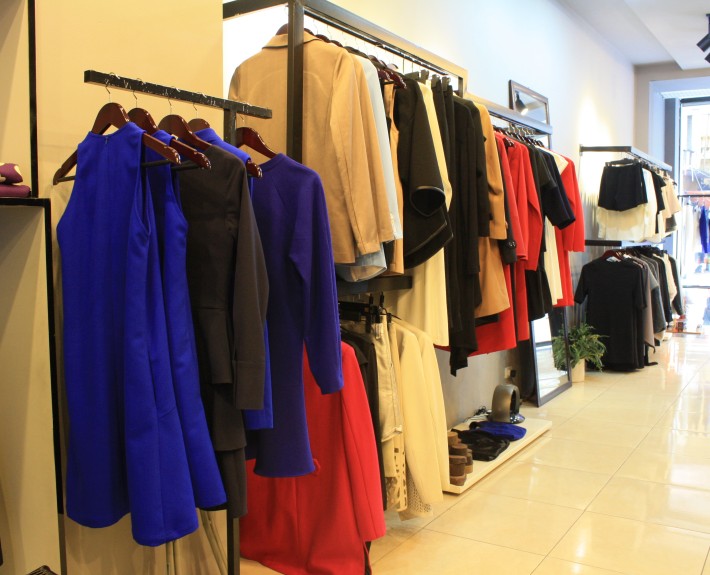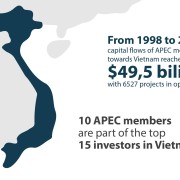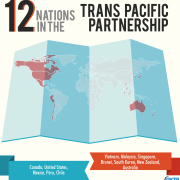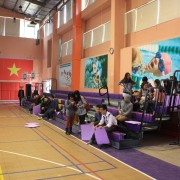Devon London by Devon Nguyen
Fashion in Vietnam has come a long way from loose shirts in the 1980s and denim jeans in the 1990s. In recent years, there has been a wave of Vietnamese from overseas who have returned to Vietnam and set up fashion houses all in an effort to shape the fashion industry in Vietnam and beyond. Kelly Bui, Helene Hoai, and Devon London are just a few brands started by pioneering entrepreneurs who have faced the odds and challenges of starting up in a nascent domestic industry.
Recently, we sat down with Devon Nguyen, CEO of Devon London to find out more about the fashion scene in Hanoi and greater Vietnam. Ms. Devon grew up in Warsaw, Poland and worked in London (where she developed herself as artist and designer) before moving to Vietnam and launching her Devon London line in 2011. She is currently based in Hanoi and opened up a second store location in Saigon about a month ago on Dong Khoi street.
For Ms. Devon, her brand’s style is different from domestic and international brands and it is geared toward people who know what they want from fashion. Ms. Devon describes the brand as stylish, sophisticated, modern, and minimalist because for her customers, they can get a Devon London outfit that they can wear beautifully. The Devon London line is designed at her studio in Hanoi and the clothes are produced in a factory in Hanoi employing some laser cutting techniques (hers was one of the first brands to utilize this technology in Vietnam for clothing).
To Ms. Devon, her brand is more than just a business. Ms. Devon is family oriented but she is also a self-described workaholic—the key for her is balance. She has a Vietnamese husband who lived London; an architect and a fellow artist. Both of their families are from northern Vietnam and she also has a brother and sister: twins who are 10 years old.
Fashion From the Start to Starting in Vietnam
Ms. Devon always knew that she wanted to be a fashion designer from an early age. In part, she had early influences from her parents as they had fashion backgrounds. However, it wasn’t until she was 15 years old that her parents treated her interest in fashion as something serious. Despite her interest in fashion at a young age, she wasn’t enrolled in creative courses as she grew up. In fact, she was self-taught and through research she learned how to draw and to sketch.
Ms. Devon has been living abroad her entire life so when she came to Hanoi, it took her a year to get adjusted to life here even though she grew up on Vietnamese values abroad since she was three years old. Even today she is still learning new things about Vietnam compared to her past. During tough times, she thought about going back to Europe but she ultimately decided to stay and persevere.
In some cities it can be easier to create than in others due to inspiring surroundings, a robust art community, and collaborative talent. When Ms. Devon arrived in Vietnam, she needed to get used to a lot of different and new things. Designing is art form so her role as a designer is to create art. At first, she was surprised that she couldn’t get inspiration—it was so hard compared to her time in London. For Ms. Devon, the hardest part of operating in Hanoi is challenging herself—not with the environment but with design technique, i.e., keeping the creativity flowing in Vietnam. Not being able to find inspiration means that the risk increases of “becoming more commercial,” which can result in an unclear picture of where to stand and brand. Thus, the real danger is being a copy of other people and losing what you were fighting for in the first place.
Suffice to say, Ms. Devon does a little bit of everything. Not only does she design the line, but she is actively involved in the PR, marketing, sourcing, and almost every other aspect of the business in Hanoi. Ms. Devon is passionate about what she does because for her, fashion is not a job—it’s part of her but it doesn’t mean that it’s always easy. Daily operational challenges include finding quality people and drawing out the most of her creativity.
The people Devon London hires have the potential to be someone in the future. Ms. Devon sees herself in them, as a version when she was just starting out; they need experience from someone they admire in a good environment and Ms. Devon provides that. In her recently opened larger location in Saigon, it was important to select the right store manager to represent the brand. As she put it, “opening a shop is easy but expanding is difficult.”
With the opening of her second store, Ms. Devon has to be more precise in training employees and she begins to scale the brand. When employing people, it requires finding experienced employees and using what you have. In the end, “we choose what’s best for us, what gives us peace of mind under a lot of stress.”
Changing Trends
Like many things in Vietnam, the fashion industry has developed a lot in recent years. In fact, the fashion scene here has been changing every year; for example, last year the fashion industry was not as developed as it is today. Two years ago there was a huge gap in the industry and three years ago no one cared about fashion shows. People were simply not interested in fashion the way they are today and as with anything new, people need some time to get used to new fashions.
Since a large part of the time for “first movers” is spent educating consumers, Vietnamese designers struggle daily. People tend to comment without knowing the real substance so they make up a story; it’s a hard path to expand to be someone and to get a brand to be where you want it to be. And if you are original then get ready to be copied because so many designers go for the “easy job.” However, customers know what is what—they are very smart. For other stores who copy Ms. Devon’s style, it’s something that she can joke about because it’s not something serious when her customers tell her, “I saw your design in another store’s window but it looked horrible.”
Still, being in the fashion community in Vietnam can be tough since there is jealousy and it’s a competitive business all the time. However, healthy competition is always good; there are new designers so it pushes Ms. Devon to be good all the time as she needs to try to be better every collection. The London Devon brand primarily competes on quality and pricing. For global super brands the design looks great, but the average income in Vietnam does not make it affordable. Devon London is a unique design which can expand consumer tastes and habits. But Ms. Devon warns, “if you want to be original then you have to be ready to be copied.”
Advice for Entrepreneurs
For other expats who come to Vietnam and settle down here, Ms. Devon recommends that they know the local language because Vietnamese people don’t speak much English. If you want to establish things then you will need to work with a lot of people which means that you will need to coordinate with local workers. Learn about the culture, how people operate and spend time to get to know where to buy things, who to speak to, and gain a bit of connections. Remember, it’s not what you know but who know.
For sure, the beginning of any journey is the hardest part. Ms. Devon advises that, “when you think of giving up then think of why you started. Nothing comes easy.” For her, when things don’t go as planned, she finds peace with her family and divides between work and home life. For example, she hasn’t worked on a Sunday in the past two years.
Also, it depends where you start in Vietnam. In Hanoi, the customer market is different compared to Saigon; there is more culture in Hanoi whereas Saigon is more commercial and more open. There, they appreciate a more unique style but in Hanoi the people appreciate something more stable and prefer to blend in in Hanoi, where people can be more judgmental.
Devon London, Present and Future
For future plans, Ms. Devon would like the collection and brand showcased in a major fashion city like London or New York but it’s a long term objective. For now, she ships orders outside of Vietnam for customers who buy online.
Ms. Devon describes her life as busy all the time but for her, busy means that she’s doing good so she doesn’t complain about it; she strives to find the right balance. Each collection she designs is different. In London she found inspiration by going to the park and relaxing or by going to an art gallery exhibition but it’s not so easy in Hanoi. Ms. Devon reads a lot of books and has learned how to be creative in Hanoi, how to train her creativity, and how to find inspiration in Hanoi. In her downtime, she travels to Thailand and Hong Kong.
In terms of future prospects overall, the Vietnamese fashion industry will grow very fast. A lot of designers like Ms. Devon are coming back to Vietnam. Furthermore, a lot of creative people are seeing that the fashion space in Vietnam hasn’t been used to the fullest, but what they do about it is the defining portion. For those that see the gaps in the fashion community, they can’t sit and complain—in other words, don’t say “we don’t have anything” instead of finding it or creating it.
Ms. Devon sees Vietnam as a source for prototyping for up-and-coming fashion designers outside of Asia due to costs of manufacturing. Furthermore, she is confident in the Devon London brand; it’s on the way and doing well. For Ms. Devon, everything is possible—nothing is impossible as long as you put your heart into it. At the end of a journey, you can say “we used the best we could and did with what we had.”
It seems like that fashion journey is just getting started for Vietnam; this month the first Vietnam International Fashion Week was held in Ho Chi Minh City (HCMC) with about half of the showcases being local designers. For some of the designers, they might be living their dream, and for others the show might be a stepping stone to something greater. Only time will tell but if you have trouble figuring out what to do, as Ms. Devon says, ask yourself, “what really makes me happy?”















